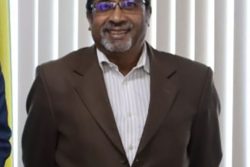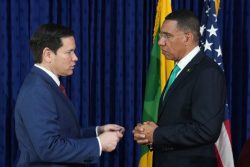Dear Editor,
The recent issue of the newsletter of the University of Guyana (UG), now titled ‘Renaissance’, has an article captioned ‘A Brief History of the University of Guyana’ by eminent historian and professor emeritus, Sister Mary Noel Menezes, in which she refers to a “Memorandum on Higher Education” that was presented to the Legislative Council in 1963 by then Minister of Education, Mr Cedric Nunes. She states also that at the inauguration of the university in 1963, the “Deputy Vice-Chancellor and Professor of Biology [was] our Guyanese Dr Harold Drayton”.
I am one of his Biology students from the first class of 1963 and have remained in contact with him over the years.
Dr Harold Drayton is an outstanding Guyanese scholar and academic of international repute. He heeded Dr Cheddi Jagan’s call and returned to then British Guiana on December 31, 1962 from the Kwame Nkrumah University in Ghana where he was a lecturer in Zoology. As Technical Advisor on higher education to the Guyana Government, he worked feverishly and under difficult conditions to transform the government’s vision into reality, thereby creating a national institution which in 2013 celebrated its 50th anniversary. Starting from scratch, in less than ten months he was able to get the UG operational with classes commencing in October 1963.
As if getting legislation in place, recruiting students, hiring staff, and finding accommodation were not challenges enough, Georgetown was paralyzed with an eighty-day general strike, including a strike of civil servants, from around the middle of April to the beginning of July 1963, in addition to disturbances and violence. This was the environment in which we, members of the first batch of students, were interviewed in an old building on Brickdam by a selection panel comprised of Dr Harold Drayton, Mr Eddie Gilbert, a secondee from the Ministry of Educa-tion who became the first registrar of UG, Mr Gyanchand, a United Nations advisor in the country at the time, and Mr Fred Case, Chief Education Officer of the Ministry of Education.
It is incredible that he was able to work through those difficult days to get the UG started.
Harold Drayton was the first Deputy Vice Chancellor and Vice Principal of UG. Also, he was Professor of Biology and Head of the Biology Department during the period 1963-72. He was instrumental in establishing a core curriculum of compulsory courses to provide a well-rounded education to students in all faculties. The benefit of courses such as Social Biology, which he taught, and Caribbean Studies were later recognized and promoted by older and more prestigious universities. And his initiatives in the Biology Department such as the training of medical technologists, etc, subsequently evolved into a full Faculty of Health Sciences for the training of health care professionals. Undoubtedly, he was one of the most popular lecturers and one of the very few individuals who lectured to students in all three faculties of the UG at that time.
After leaving UG, Drayton joined PAHO as a consultant in Human Resources Development, stationed in Barbados. During this time he worked extensively to improve health education in the region while still maintaining contacts and providing advice to UG and the Ministry of Health. In 1989 he moved to the University of Texas Medical Branch, Galveston, Texas, USA, as Director, WHO Collaborating Centre for International Health and Professor of Preventative Medicine. Again, he visited Guyana frequently providing advice to the Faculty of Health Sciences and the Ministry of Health, occasionally securing funding for various projects.
In 2002, under my leadership, the UG Guild of Graduates, Ontario, published a book titled The Univer-sity of Guyana – Perspectives on the Early History. In this book, the first three key players in the history of UG tell their stories – Dr Harold Drayton, the Deputy Vice Chancellor who set up UG in 1963; Professor Alan Earp, a Canadian and the Vice Chancellor who oversaw the construction of the Turkeyen campus; and Dr Dennis Irvine, a Jamaican and the Vice Chancellor who moved UG to Turkeyen and led the institution through its best years.
In writing about the Memorandum on Higher Education referred to by Sister Menezes, Dr Drayton states “The next item [after addressing the appointment of Vice Chancellor, Lancelot Hogben] in my Action Plan was to write a Memorandum on Higher Education for presentation (Sessional Paper No.2/1963) in February to the Legislature by the Minister of Education, as an introduction to the draft University Ordinance. I had already discussed the essential provisions of that Bill with the Solicitor General Mohamed Shahabuddeen and the Attorney General Fenton Ramsahoye”.
As noted by Sister Menezes, Pro-fessor Lancelot Hogben, a Welshman, was the first Vice Chancellor. However, Professor Hogben had minimal involvement in setting up the university. He first visited Guyana for a few weeks at the end of March 1963, went back to his homeland, and then returned just before the inauguration in October which was memorable for his inaugural address among other things, including for the first time in Guyana an assembly of colourful capped and gowned academics on stage.
Copies of the earlier mentioned book were donated to UG’s library and the Georgetown Public library. Also, on the occasion of UG’s fiftieth anniversary, seventy-five copies were donated to the 50th Anniversary Committee for sale to raise money for the Anniversary Fund. Recently, I was informed that thirty-five copies are still available at UG. Further, I am aware that Dr Drayton’s files and papers on UG were donated to the Walter Rodney Archives in George-town as UG, due to inadequate library space, could not assure that all the documents will be kept together as a collection. And finally, Drayton’s autobiography titled An Accidental Life is currently with the printers and should be released before the end of this year.
Today “Jagan’s night school” is accepted as a national institution. Many of the country’s leaders, including President David Granger, are its graduates. I hope those interested in knowing more about the early history of the UG will consult the sources mentioned. More importantly, I believe that Harold Drayton deserves one of Guyana’s highest national awards, a recognition that has been denied him by successive governments to date.
Yours faithfully,
Harry Hergash








